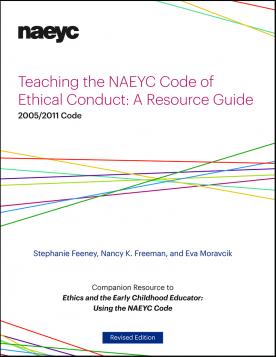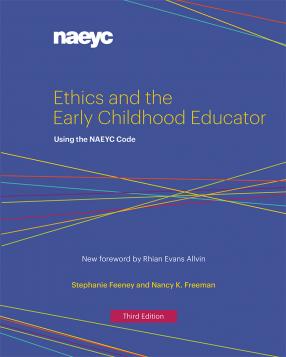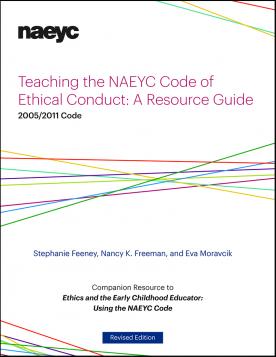Code of Ethics for Early Childhood Educators

You are here
A Position Statement Held on Behalf of the Early Childhood Education Profession
Along with core knowledge, skills, values, and dispositions, early childhood educators who work in homes, centers, and schools have professional, ethical responsibilities. These responsibilities guide the ethical decision making and behaviors that support each and every child’s healthy development, learning, and well-being.
NAEYC Code of Ethics
About Position Statements
NAEYC Position Statements are used by the Governing Board to state the Association's position on issues related to early childhood education practice, policy, and/or professional development for which there are controversial or critical opinions. Position statements are developed through a consensus-building approach that seeks to convene diverse perspectives and areas of expertise related to the issue and provide opportunities for members and others to provide input and feedback.
Purpose
The “Code of Ethics for Early Childhood Educators” outlines the essential ethical responsibilities for the early childhood education profession. This means it speaks to a set of professional ethics—the moral responsibilities that go beyond personal beliefs and that guide decision making and behavior in a workplace.
The Code is intended to be helpful to all individuals who care for and promote the learning, development, and well-being of children birth through age 8 in all early childhood settings, as well as program administrators and those involved in educator preparation and support. The accompanying “Statement of Commitment” provides a way for individuals in the early childhood field to acknowledge and embrace the distinctive values and ethical obligations an early childhood education professional has to young children, families, and other educators. Individuals who commit to upholding the Code and programs that promote awareness of and adherence to it help to strengthen the field’s professionalism and ethical behavior.
Although not all issues educators confront have a moral or ethical component, early childhood educators do face daily ethical challenges, often without sufficient support or resources. Early childhood educators navigate hard decisions that may conflict with our personal beliefs or well-being, while also working within systems that can be inequitable or unjust. All practitioners can use the Code as a guide for and defense of ethical conduct and decision making, especially when navigating complex dilemmas that require professional judgment.
The ethical standards in this Code of Ethics focus on areas of practice over which early childhood educators have professional autonomy and decision-making authority. The Code guides educators’ responsibilities to others—children, families, colleagues, employers, communities, and society. While society has a responsibility to support early childhood educators, and educators have ethical and moral responsibilities to ourselves and our own well-being, the purpose of this Code is not to address the ethical obligations that others have toward educators, nor the responsibilities educators have to ourselves
Position
Along with core knowledge, skills, values, and dispositions, early childhood educators who work in homes, centers, and schools have professional, ethical responsibilities. These responsibilities guide the ethical decision making and behaviors that support each and every child’s healthy development, learning, and well-being.
Supplements
- History and Development of the Code of Ethics for Early Childhood Educators
- Theoretical Grounding Informing the Code of Ethics for Early Childhood Educators and Ethical Decision-Making
- Showing Our Work: Educator Engagement in the Code of Ethics Revision Process
Thank you to the workgroup members who have done tremendous heavy lifting in bringing us to this point.
Gracias a los miembros del grupo de trabajo que han hecho un tremendo trabajo para llegar a este punto.
- Leah Austin, President and CEO, The National Black Child Development Institute
- Raquel Diaz, Implementation Consultant for Triple P
- Cynthia DiCarlo, Professor of Early Childhood Education, Louisiana State University
- Christyn Dundorf, Co-director, Teaching Preschool Partners
- Zeynep Isik-Ercan, President, National Association of Early Childhood Teacher Educators and Department Chair of Early Childhood, Rowan University
- Benita Flores-Muñoz, Member of the NAEYC Commission on Early Childhood Higher Education Accreditation and Retired ECE faculty , Del Mar College
- Robin Fox, Interim Provost, University of Wisconsin Whitewater
- *Stacey French-Lee, NAEYC Governing Board Member, and Clinical Assistant Professor, Executive Director of the Campus Child Development Program, Early Childhood and Elementary Education, Georgia State University
- Heidi Friedel, NAEYC Faith Based Interest Forum Facilitator, Early Childhood Consultant, and Staff Support Specialist for ECE Subhub
- Eugene Geist, Associate Professor, Louisiana State University
- Georgia Goldburn, Executive Director, Hope For New Haven and Co-founder,CERCLE
- *Brian Johnson, NAEYC Governing Board Member, and Assistant Dean, James Madison College at Michigan State University
- Sim Loh, Public Policy Specialist, First Up: Champions for Early Education
- Andrea Maldonado, Director of Quality Assessment and Recognition, National Association for Family Child Care
- Meir Muller, Associate Professor of Early Childhood Education,University of South Carolina
- Ernesto Muñoz, Senior Project Manager of Curriculum Literacy, University of Texas
- Richelle Patterson, Senior Policy Analyst, National Education Association
- Anu Sachdev, President, ACCESS and Adjunct ECE Faculty, East Stroudsburg University
- **Ian Schiefelbein, ECE Faculty, Central New Mexico Community College
- Ashley Simpson, BIPOC Educator Recruitment and Retention Strategies Program Manager, Aurora Public School District
- *Toni Sturdivant, NAEYC Governing Board Member, and Director of Early Learning, Mid-America Regional Council
- Tracy Weston, GAEYC District 1 Representative and Co-Founder, Noah's Ark Preschool Academy of Terrell, Inc.
- **Reginald Williams, Full Professor of Early Childhood Education, South Carolina State University
*Current NAEYC Governing Board Members
**Former NAEYC Governing Board Members
We would also like to lift up the generosity of individuals who have offered their guidance and expertise as informal and formal advisors, including but not limited to:
También nos gustaría agradecer la generosidad de las personas que han ofrecido su orientación y experiencia como asesores formales e informales, incluidos, entre otros:
- Angela C. Baum, Senior Associate Dean for Academic Affairs & Professor, Early Childhood Education, University of South Carolina
- Mélanie Dixon Director, Professional Practice, College of Early Childhood Educators, Ontario, Canada
NAEYC is grateful to our funders and supporters who make this work possible, including those who have donated through the Marilyn M. Smith Applied Research Fund.
NAEYC agradece a nuestros financiadores y patrocinadores que hacen posible este trabajo, incluidos aquellos que han donado a través del Marilyn M. Smith Applied Research Fund.
Crosswalk of Revised Code of Ethics
Printable Statement of Commitment
Get the Brochure
Code of Ethics Webinar
Were you unable to join the Code of Ethics webinar live? Follow the link below to watch the recording in English or Spanish!


